Current as of: February 14, 2026 - 14:34
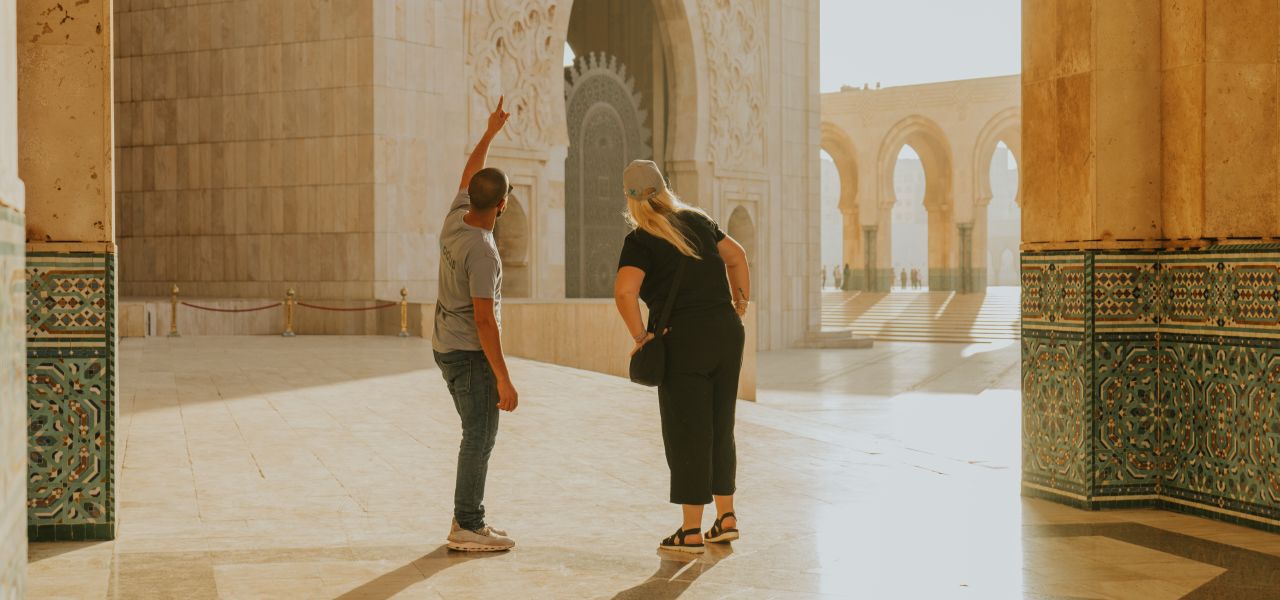
Treasures of Morocco - Premium Adventure Trip Notes
- Ways to Travel: Guided Group, Premium Adventures
- Destination: Morocco
- Programmes: Culture
-
Activity Level:
2 out of 7 - Easy & Moderate
- 12 Days: Land Only
- Ages: 16+
- Trip Code: AML
- Carbon Footprint: 18kg CO2e
Trip Overview
From Casablanca to Marrakech, discover the many wonders of this enchanting north African kingdom
Few places on earth match the cultural diversity of Morocco. Join this Premium Adventure to discover the best of it, while staying in a carefully selected accommodation portfolio, which includes traditional riads and a luxury desert camp. We tour diverse cities, including seaside Casablanca, the imperial powerhouse of Fez, and electric Marrakech. And we journey into the Sahara, where we navigate dunes on camelback and stargaze around a campfire. Village visits, kasbah tours, lunch with an Amazigh family and a relaxing hammam session complete a perfectly balanced adventure that captures the best of Morocco in style.
At a Glance
- Accommodation: 11 Premium nights (5 hotel, 5 riad and 1 desert camp)
- Travel by private minibus and camel
- Group normally 5 to 16, plus leader. Minimum age: 16
Highlights
- Discover the culturally rich cities of Casablanca, Marrakech and Fez
- Visit the Roman ruins of Volubilis and the ksar of Ait Benhaddou
- Take a camelback ride through the Sahara to a luxury camp
- Experience a traditional hammam
- Join a cookery class and enjoy the results
- See the High Atlas Mountains and have lunch with an Amazigh family
Is This Trip for You?
This trip is rated Activity Level 2 (Easy & Moderate). For more information on our trip gradings, visit the Activity Level Guidelines page. If you have any queries about the difficulty of the trip, please contact us.
Journeys: Morocco is stunning but large and the cities and country areas are spread out. This means there are sometimes long journeys, but this is the only way to see all the country offers. We are not confined to our vehicle though, as there are plenty of photo stops and opportunities to stretch your legs. Approximate drive times are noted on the daily itinerary.
Climate: It is hot in summer, but we try to make the most of the coolest parts of the day for our sightseeing so expect some early starts. It can get very hot in the desert from May to September. Morocco can get cold in winter though usually daytime temperatures are mild. Pack winter clothes for November to March when nighttime temperatures can drop considerably, especially in the desert and mountains. During these months, there can also be rain throughout the country and snow in the mountains. As Morocco is generally mild to hot, it is not set up for colder temperatures, so there may not be heaters available. Please pack winter clothes and nightwear to ensure you are comfortable. You can also ask for more blankets from the hotels.
Ramadan: The holy month of Ramadan is expected to run from 17 February to 19 March 2026. One of the most important periods in the Islamic calendar, it is a special time to visit a Muslim country. Our tour leaders and drivers choose to work at this time so we continue to run trips; however, their energy levels may be slightly lower than normal. Many tourist sites, restaurants and shops run an amended schedule, but your tour leader knows how to adapt the itinerary to experience all the inclusions on this trip and maximise your experience during this special time.
Eid al-Adha: The Eid al-Adha celebration runs from 26-30 May 2026. Some businesses may close or run an amended schedule during this period.
Water: It is advisable to only brush teeth with bottled/boiled water and to avoid salads washed with tap water.
Group
All departures have a tour leader, chosen for their expertise. They are fully qualified English-speaking Moroccan guides. In some locations, we are also joined by a guide local to the area.
Adult min age: 16
Min group size: 5
Max group size: 16
Itinerary
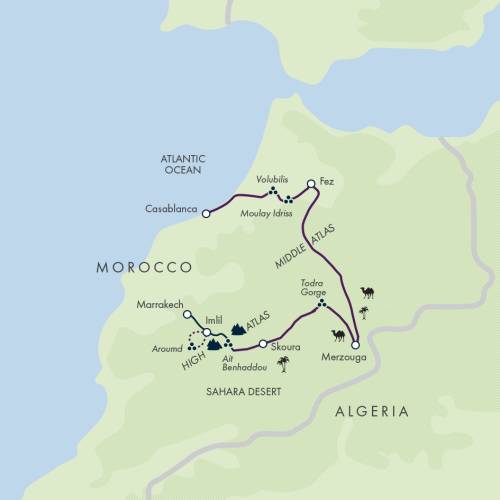
Land Only
- Start City: Casablanca
- End City: Marrakech
Land Only Itinerary
Begin your adventure in the port city of Casablanca, the economic hub of Morocco.
Around 6pm, say salam alaikum to your tour leader and fellow travellers, when we gather as a group for the first time to get to know each other and learn more about the adventures ahead.
Want to explore further? Secure pre-tour nights through your sales representative.
Accommodation: Idou Anfa Hotel (or similar)

This morning, before leaving Casablanca, we visit the Hassan II Mosque, which has a soaring 655ft (200m) minaret and a sliding ceiling to enable the sea breeze to cool the building. We have a guided tour of the Mosque and the stunning ablutions hall with a local specialist. Please note knees and upper arms must be covered. We then begin our journey to Fez, stopping en route at Unesco-listed Volubilis, the largest and best-kept Roman ruins in Morocco. There are the remains of the forum, basilica and capitol. There are also well preserved mosaic floors of the wealthy town houses that graced this Roman city. After Volubilis we travel on to the attractive whitewashed holy city of Moulay Idriss to stretch our legs and have a traditional lunch. The town is built around the tomb of Moulay Idriss Morocco’s first Islamic leader. We will take a walking tour to see parts of the town. Our final destination is the world-renowned city of Fez, where our accommodation for the night is a traditional Riad. We enjoy a welcome dinner here, a chance for us to try tasty local fare and get to know one another.
Total drive time: Seven hours
Accommodation: Riad Dilar/Riad Salam (or similar)

Fez is the intellectual and religious centre of Morocco. Founded more than 1,000 years ago, it is the oldest of the Imperial cities in the kingdom with many mosques and madrasas (theological colleges). It was declared a World Heritage site in 1981. This morning, we join our local guide to explore the bustling narrow laneways, visiting different sections of the souq, including those selling leather, brass and copper. We also stop at the tanneries and pottery workshops to see traditional local crafts in action. Outside the medina, we visit the Jewish District (Mellah) and the exterior of the Royal Palace. We drive to a panoramic viewpoint for great photos of the city below.
After the tour, return to the riad to rest or head to Hotel Saharai, where you can gaze over Fez medina with a cocktail as the sun sets. Your tour leader can help organise your visit (paid locally).
Accommodation: Riad Dilar/Riad Salam (or similar)
We start early for a full day of travelling to the Sahara with a journey through superb scenery and plenty of stops along the way. Our journey takes us over the Middle Atlas, through the picturesque Ziz Valley to the Hamada, a flat, stony desert gradually approaching the golden dunes of Erg Chebbi. The journey is undoubtedly worth it, and we’re rewarded with a night at the feature accommodation at Riad Madu or Riad Chebbi. Relax by the pool and enjoy watching the sun set over the desert.
Total drive time: Nine hours
Accommodation: Riad Madu or Riad Chebbi (five-star)

Enjoy a leisurely start to the day (with perhaps another dip in the pool). Later this morning, we travel by 4×4 to Khamlia village for a wonderful cultural experience watching a Gnawa music show and eating a traditional lunch of Medfouna, a surprising take on pizza. The unique instruments used in Gnawa music create a distinctive sound. It is a unique blend of African, Arab and Amazigh influences. This afternoon, we transfer to our luxury desert camp and then undertake a genuine Saharan experience – a camel trek through the dunes to watch the desert take on a rose colour at sunset (it is also possible to walk). After dinner cooked by our local chefs, we sit around the campfire and gaze at the stars.
Accommodation: Merzouga Desert Camp (or similar)
Leaving the desert, we head towards the little town of Skoura. En route, we pass through the Todra Gorge, sheer cliffs rising dramatically on either side of the road. We take a short walk through this gorge so you can appreciate its majesty and take photos. Following the 1,000 Kasbahs Road for approximately two hours, we see several of these imposing buildings along the way in the palm groves. We stay in an original Kasbah lodge during our two nights in Skoura. Located in the heart of the Skoura Palm grove this lodge is decorated in traditional Moroccan style and all rooms have air conditioning.
Total drive time: Seven hours with three stops
Accommodation: Kasbah Ben Damiette (or similar)
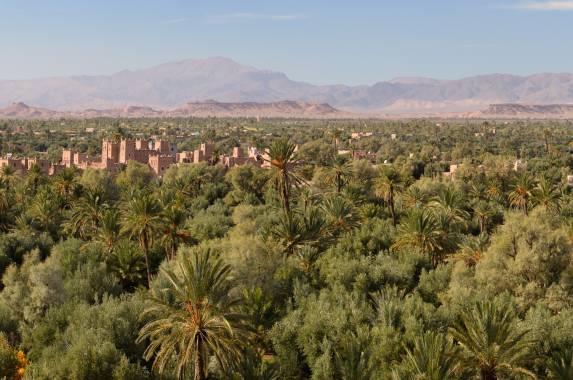
Enjoy a leisurely breakfast and then join the leader on a guided walk through the palm groves of sleepy Skoura. Dotted around the palm, fig, birch and tamarisk trees are some of the most beautiful kasbahs in southern Morocco, the largest of which is the Amerhidil Kasbah, once owned by the Glaoui family. We take a guided tour through the restored interior with a local guide. During our walk we stop for a picnic lunch.
Accommodation: Kasbah Ben Damiette (or similar)
Leaving Skoura, we rejoin the main road and drive west along the 1,000 Kasbahs Road via the desert city of Ouarzazate and onto the well-preserved ksar (fortified village) of Ait Benhaddou. This UNESCO World Heritage site is one of the most spectacular in the Atlas, and a location for several Hollywood films including Gladiator (2000). After admiring this vast site from the riverbed, we take a walk through the winding village streets. Once a bustling village today the ksar is home to around 10 families. From here we continue our drive through the High Atlas Mountains, crossing Tizi n’Tichka Pass at 7, 415ft (2,260m) above sea level. The drive to the village of Imlil is a winding one with a variety of scenery to enjoy.
Total drive time: Eight hours with stops
Accommodation: Riad Jnane Imlil (or similar)
Imlil village is the starting point for trekkers climbing Mount Toubkal, the tallest mountain in North Africa. A two-hour hike (which has a steep 655ft/200m ascent) takes us to the small Amazigh village of Armed set into a hillside.
Along the way, we see many fruit trees including cherries, apricots and quince. We follow a small irrigation channel where we are likely to meet villagers and their mules. Stopping at the edge of a waterfall, we take a break with a fresh orange juice. From here, we carry on uphill to the village where we enjoy a home-cooked lunch in a local guesthouse.
For those who do not want to walk, mules are available (35 dirhams each way, payable locally).
After lunch, we do a little more hiking around the village then return to Imlil (a one-hour hike) for your traditional hammam experience. A standard treatment with soap and scrubber is included but it is customary to give a 20-dirham (US$2) tip. The restaurant at our riad has panoramic views of Imlil and the mountains.
Accommodation: Riad Jnane Imlil (or similar)

This morning, we travel over the High Atlas Mountains to Marrakech. Along the way, we stop at a women’s argan oil cooperative where we see a demonstration of how this multi-use oil is produced. There is also an opportunity to purchase a range of products which make for an unique gift from Morocco. Onwards our journey takes us to the flat arid plains of Marrakech. Here we have a guided tour, visiting the Bahia Palace and the Saadian tombs. The tour ends in the central square of Djemaa el Fna, where the town becomes a maze of bustling bazaars, palaces and mosques. The square comes alive every evening with food stalls, juice-sellers and acrobats entertaining both the locals and the visitor. Our final accommodation on this tour are boutique hotels located in the modern town area of Gueliz.
Total drive time: 1hr 30min
Accommodation: Stars or Bab or 2 Ciels Hotel (four-star)
Start with a trip to the local market to purchase ingredients before embarking on a cookery class of recipes to impress your friends when you get home. Enjoy the fruits of your labour for lunch. This afternoon, take free time to see more of Marrakech. You might wish to visit the largest mosque in the city, Koutoubia, or venture through the souqs and old streets of the medina. After bartering for souvenirs, you may have time for a short visit to the Koranic School and Museum of Marrakech. After this, you can unwind by taking a 30-minute ride on a calèche (a horse-drawn carriage) to the Jardin Majorelle. These tranquil gardens are decorated throughout in indigo blue and were once owned by Yves St Laurent. Your expert leader can help plan your free time.
This evening, enjoy a farewell dinner together, in which we can discuss the adventures we’ve had and, perhaps, plan the next.
Accommodation: Stars or Bab or 2 Ciels Hotel (four-star)
We’ve scaled dunes on camelback, eaten lunch with an Amazigh family and toured the greatest cities in Morocco. But after breakfast, this tour draws to a close. Speak to your sales representative if you’d like to extend your stay in Marrakech and explore the city further.
Extend Your Trip
Marrakech Hotels & Riads
A city of vibrant souks, ornate palaces and fragrant gardens, where ancient traditions meet modern energy. Extra nights here give you time to wander the medina, relax in hidden courtyards and soak up the city’s atmosphere at your own pace. Here are a few of our favourite hotels to inspire your stay:
Kenzi Rose Garden: Set within expansive landscaped gardens in Marrakech’s Hivernage district, this comfortable hotel offers a peaceful retreat close to the city’s main attractions. With multiple pools, spacious rooms and a relaxed atmosphere, it’s an ideal base for unwinding after exploring the medina.
Riad Moullaoud: Tucked away in the heart of the medina, this traditional riad offers an intimate and authentic Moroccan experience. Centred around a tranquil courtyard with a small pool and rooftop terrace, it’s perfect for travellers wanting charm, character and easy access to Marrakech’s souks.
Es Saadi Marrakech Resort: Located in the upscale Hivernage area, this stylish resort combines luxury accommodation with lush gardens, art-filled interiors and excellent dining. With a large spa, pools and views towards the Atlas Mountains, it offers a refined and relaxing end to your adventure.
This is just a glimpse of what’s possible. Speak to your sales representative, who can guide you through the options and arrange everything for you.
Accommodation
Premium hotels and camp
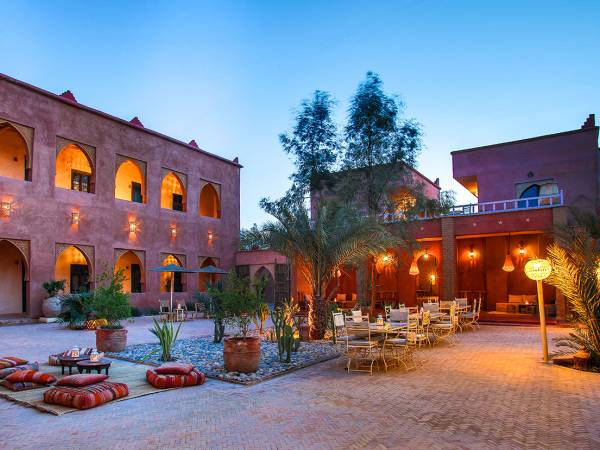
Experience elevated accommodation on this Premium Adventure, where we mostly stay in four- or five-star properties, plus a luxury Bedouin camp among the Sahara dunes. Find a list of the properties typically used below:
- Casablanca: Idou Anfa Hotel (night 1)
- Fez: Riad Dilar or Riad Salam (nights 2-3)
- Merzouga: Riad Madu or Riad Chebbi (night 4)
- Sahara: Merzouga Desert Camp (night 5)
- Skoura: Kasbah Ben Damiette (nights 6-7)
- Imlil: Riad Jnane Imlil (nights 8-9)
- Marrakech: Stars or Bab or 2 Ciels Hotel (nights 10-11)
Worth knowing
- The accommodation shown has been booked and agreed in advance; however, we may need to make changes to a property of similar or higher standard after you have booked. We will endeavour to inform you of any changes in advance, which could, on rare occasions, be at late notice.
About riads
Riads are traditional Moroccan homes, generally in the old part of the city or medina, where the wealthiest people would historically live. They’re typically built around a central corridor with windows facing an internal courtyard (external windows are rare). Most have a rooftop terrace where breakfast is served. A night in a riad is an authentic Moroccan experience; however, riads do not have hotel-style facilities. Additionally, the rooms are not standardised and come in different sizes and shapes. Riads are built to keep sunlight to a minimum in order to keep the interiors cool in the extreme summer heat.
Single supplement from CAD 1643
Accommodation - Pre Trip
Pre-tour accommodation available in Casablanca on request.
Accommodation - Post Trip
Post-tour accommodation available in Marrakech on request.
Food & Drink
There are 11 breakfasts, three lunches and eight dinners (one of which is a cooking class) included on this trip.
There’s a welcome dinner at our riad in Fez, and home-cooked lunches when we stay in the Sahara and the High Atlas. We also have an included dinner at our lodge in Skoura to sample their homegrown produce. In Marrakech, try creating local delicacies in a master cooking class and then enjoy the results.
Moroccan food is, generally speaking, excellent though not particularly varied. Breakfasts usually consist of bread and jam with coffee or tea. Meals eaten out are reasonably priced – kebab and bread is approximately 72 Moroccan dirhams (US$7). In main towns, it is possible to find very good French and Moroccan restaurants where a meal and French wine will cost anything from 310 dirhams (US$30) upwards. Generally, dinner is likely to cost 80-155 dirhams (approximately US$8-US$15) not including drinks. Local beer, wine and soft drinks are reasonably priced, but you can pay more for imported alcohol. Your leader will recommend restaurants for each evening.
Vegetarians can be catered for but there is a fairly limited choice of vegetarian cous cous, tajine or omelettes, particularly during the more rural sections of the trip. If you have any special dietary requirements inform your sales representative in plenty of time before the trip. If you have a specific medical/dietary need (ie coeliac or vegan) you may find it helpful to bring some food items with you from home.
Transport
For most of this trip, we use a private air-conditioned bus. The bus sizes vary depending on group size but has plenty of room for sitting in different seats. The roads in Morocco are reasonably good throughout. On mountain roads, the pace will be slower.
Weather & Seasonality
From April to June and in September, Marrakech and the north are pleasantly hot with temperatures averaging 26C (79F) in the day and 16C (61F) at night. It is unusual for there to be much humidity so it is quite pleasant except at midday when the sun is very strong. Desert temperatures are similar to those in Marrakech, with the nights usually a little cooler and the days a little hotter. Mountain temperatures are cooler than in Marrakech.
In winter, daytime temperatures in Marrakech are around 18C-22C (64F-72F) with night temperatures of 4C-7C (39F-45F). The days should be sunny and a particularly attractive feature of winter is the clear views of the snow-covered Atlas Mountains. The temperatures in the south are generally a little higher than those north of the mountains. There is a small chance of rain and it has even been known to snow very infrequently in January and sometimes February on the higher desert plateau (in which case it is cold at night and early in the morning on the southern side of the Atlas).
Joining Instructions
Key information
Start hotel: Gray Hotel, Angle Rue Ain El Aouda et Rue Abou Al Kacem El Kotbari, Quartier Casablanca, 20100
Phone: (+212) 5224-27800
Recommended arrival time: You can arrive at any time today. Hotel check-in is from 2pm and we have a welcome briefing around 6pm this evening.
Airport: Casablanca Airport (CMN)
Getting to the start hotel
The start hotel is approximately a 45-minute drive from the airport. Exodus provides free arrival transfers to the start hotel from the airport for all customers.
If you would like further information on joining this trip, please speak to your sales representative.
Catching your return flight
Exodus provides free departure transfers for all customers to Marrakech airport (from the end hotel). If you’re not taking the Exodus transfer, allow three hours for check-in, bag drop, immigration and security.
Please note, unless specified otherwise, the transfers will be to the start (or pre-tour) hotel and from the end (or post-tour) hotel and will be on the date on which the tour starts/ends; transfers to other hotels in the same city and/or on different dates may attract an extra charge. Transfers should be booked with your sales representative at least two weeks before the tour starts.
Marrakech airport
Upon departure from Marrakech, we suggest allowing three hours to navigate the airport: check in, bag drop, immigration and security can take even longer on exit. The airport doesn’t accept mobile boarding passes, so we suggest having a printed boarding pass to avoid subjecting yourself to further delays.
Full joining instructions including local emergency numbers will be sent to you as part of our Final Joining Instructions. If you do not receive these at least a week before departure, or require them earlier please contact our office or your travel agent.
Location start: Casablanca
Location end: Marrakech
What To Take
Essential Equipment
- Water bottle
- Sunhat, sunscreen and sunglasses
- Backpack
- Lightweight walking boots with good ankle support and sole protection
- Torch (flashlight)
- Light jacket
- Swimwear
- Towel
For November to March departures, it is advisable to have:
- Fleece jacket and waterproof jacket
- Gloves
Although Morocco is a Muslim country, the dress code in the large cities is not as strict as it used to be. It is fine to wear shorts and sleeveless tops. When entering mosques and in more rural areas, it is advisable to be more modest and wear clothes covering shoulders and knees. Additionally, women should avoid wearing revealing clothes.
Water included: Plastic bottles are a big issue in many countries where recycling isn’t yet widely available; they often end up in landfill or get burned. Both processes are harmful to the environment and we would like to reduce our impact here. For your trip, we provide an alternative to single-use plastic bottles to reduce the plastic used. This means that safe drinking water will be available throughout; all you need to do is bring a bottle to refill along the way. Please add this to your packing list.
Practical Information
Visa
Morocco
Travellers from the UK, US and EU normally do not need a visa to enter Morocco. Please note, visa requirements often change and it is your responsibility to obtain any required visas for this trip. Therefore, we recommend that you check with the nearest embassy or consulate of your chosen destination(s), including any countries you may be transiting or transferring through.
Some local governments provide guidance on what visas their citizens need. To help, we’ve gathered a selection of useful links below.
• Australia: www.smartraveller.gov.au/destinations/africa/morocco
• Canada: www.travel.gc.ca/destinations/morocco
• United Kingdom: www.gov.uk/foreign-travel-advice/morocco/entry-requirements
• USA: www.travel.state.gov/content/travel/en/international-travel/International-Travel-Country-Information-Pages/Morocco.html
Vaccinations and Health
There are no required vaccinations. However, you may want to consider vaccinations for tetanus, hepatitis A, hepatitis B, rabies, tuberculosis and typhoid. A polio vaccination certificate may be required for some travellers. Please confirm your needs and requirements with your doctor or travel clinic.
There is evidence that Middle East respiratory syndrome coronavirus (MERS) is spread by contact with camels. This trip includes a sunset camel ride in the Sahara, which is undertaken at your own risk; we suggest that you visit the Travel Health Pro website which includes information about the virus.
Local Time
Morocco's time zone: Africa/Casablanca (UTC +01:00)
Electricity
Morocco's electricity: Plug types C (two round pins, European standard) and E (two round pins) – 220V, 50Hz
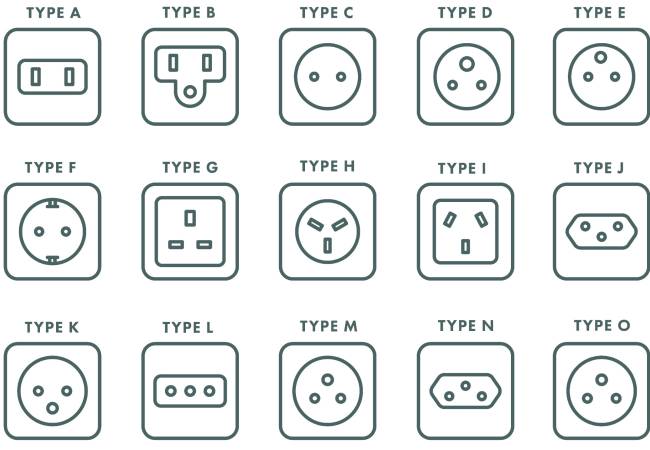
Money
Morocco's currency: Moroccan dirham (MAD), a non-convertible currency. You can only import/export a maximum of 2,000 dirham to or from Morocco.
ATM Availability
It is easy to use Visa/Mastercard at the ATMs in larger towns and cities. Credit cards are normally accepted for more expensive souvenirs, such as carpets (most shops charge up to five percent extra for the use of credit cards).
Extra Expenses & Spending Money
We recommend you change your money at the airport into the local currency, as Morocco only allows 2,000 dirhams to be imported or exported. There is no limit on the amount of foreign currency you take. When changing your money, ensure you keep hold of your exchange receipt as you may need to show it at the airport bank at the end of your trip where it’s normally possible to change any unspent dirham notes back into euros, British pounds or US dollars. Allow approximately 30-70 dirhams (US$3-US$6.50) per day to cover small souvenirs, soft drinks etc. See the Eating and Drinking section for more details on expenditure.
Tipping
Tips are included in the tour price for hotel staff, restaurant staff where dinners are included, and other local staff, including the driver. However, a tip has not been included for your tour leader.
Tipping your tour leader is entirely at your discretion; however, if you would like to recognise their good service, we suggest around 55-90 dirhams (US$6-US$10) per day. Tipping the tour leader is usually done on the last night of the tour – often groups will pass around an envelope so everyone can put in what they feel comfortable with anonymously.
Sustainability and Impact
As a certified B Corp, we’re on a mission to improve our social and environmental impact across all our adventures.
We do this through our innovative Thriving Nature, Thriving People plan.
This ‘nature positive’ approach is designed to help nature and communities thrive in harmony through practical solutions, such as reducing carbon and waste on our trips, supporting conservation projects through the Exodus Adventure Travels Foundation, and rewilding 100 square metres for every Exodus traveller.
Important Information
Your Safe Participation
When booking this trip, you should be confident in your ability to participate in all activities described in these Trip Notes. If you have any doubt about your suitability, please call us and ask to speak to one of the experts on this itinerary.
Although our leaders are well trained to deal with different capabilities, if they have any concerns about someone’s ability to safely take part in an activity, or their impact on other people’s enjoyment, we authorise them to take necessary action which, in some circumstances, may involve asking someone to miss that activity.
By booking this trip you agree to our Booking Conditions which clearly state that our leaders have the authority to do this. In these rare instances we will ensure anyone sitting out is safely provided for and offered alternative options where possible. Refunds will not be provided for activities missed and customers may be liable for additional costs incurred.
Seatbelts
All vehicles used by us should be equipped with working seatbelts, except where approved by us based on the vehicle type or journey. Wherever seatbelts are available, we require our customers to use them for their own safety, even where it may not be a legal requirement.
Travel Safety
For additional information please have a look at the travel safety advice page on our website.
How to Book
Speak to our friendly team of experts to plan your adventure:
- Check availability: our website shows real-time availability of our guided group tours, or contact our team by phone, email or live chat.
- Hold a space: You can provisionally hold a space on any guided group tour to give you time to finalise your travel plans.
- Confirm your booking: Payment of a deposit will complete your booking and secure your place on the trip.
After booking
You will receive a confirmation document and invoice, which includes extra information and guidance about your travel arrangements. Our dedicated Customer Operations team will help you with any pre-travel questions or arrangements and can easily add extensions or extra accommodation to your booking. Final Joining Instructions will usually be sent out two to three weeks prior to departure.
Adding transfers to your booking
If you have arranged your own flights and would like to add transfers to your booking, please provide your arrival and departure details to our Customer Operations team around four to six weeks before departure.
- Where free transfers are included, they are available for any flight but can only be added to your booking once we have received your flight schedule.
- Where group arrival and departure transfers are available, these operate at fixed times. You will need to arrive in time to meet the scheduled transfer. If the timings don’t align with your travel plans, our team can arrange private transfers once they receive your flight schedule.
Trip Note validity
Trip notes may be updated after booking; if any updates significantly impact the inclusions or itinerary you will be advised in writing. A link to the most up-to-date Trip Notes will be sent out with your Final Joining Instructions before departure.
The information in these Trip Notes is given in good faith. All holidays can be subject to unexpected changes, and occasionally it may not be possible to follow the itinerary as planned. In these circumstances we will make the best-possible alternative arrangements that maintain the integrity of the original itinerary.

